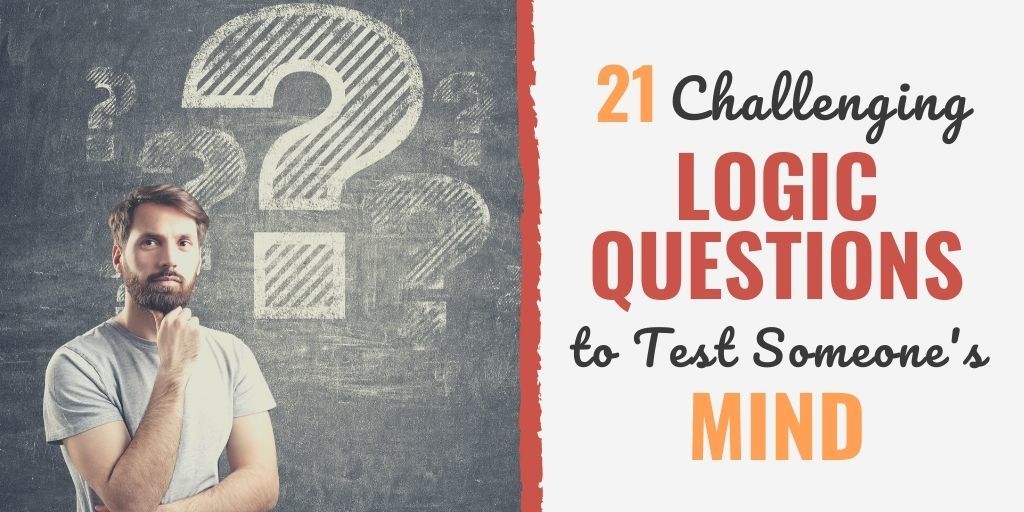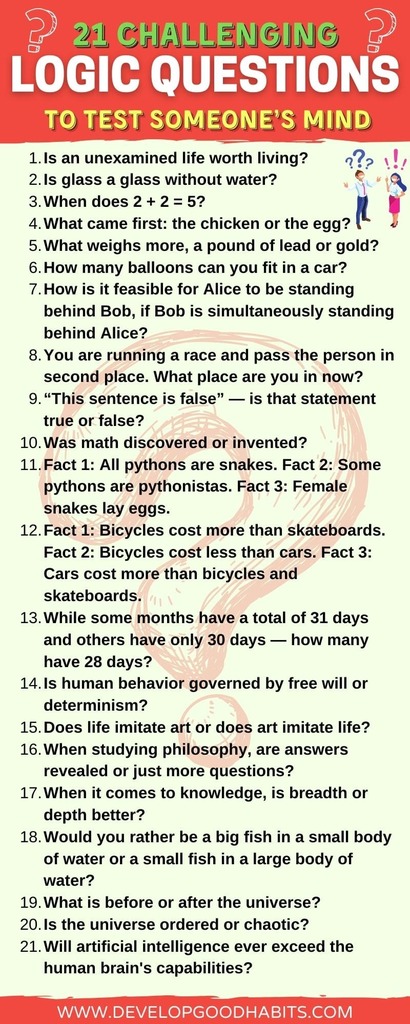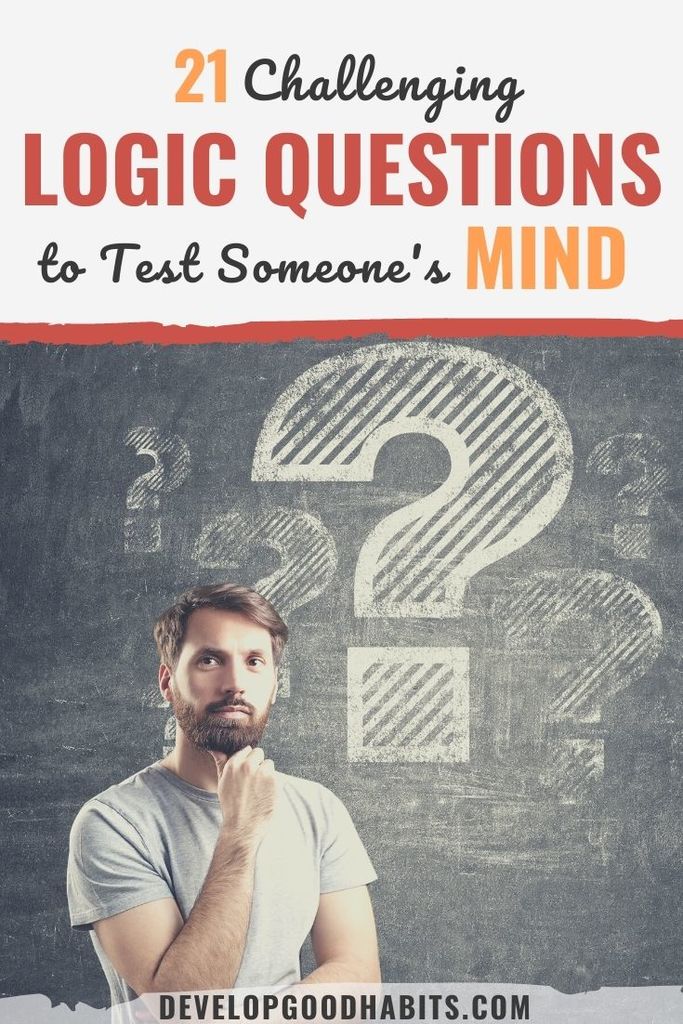One fun way to create a fun conversation and/or get to know someone better is to ask logic questions.
By testing someone’s mind you can get to know them a little better in an interesting way.
So in this article, we have 21 challenging logic questions that can be peppered into your exchanges with the folks you meet or even longtime friends. But first, let’s answer a simple question.
What are Logic Questions?
Logic questions make people think more deeply about the nature of the topic at hand or can be used to approach an idea from another direction. It can be useful to ask logic questions conversationally when trying to get inside someone else's perspective.
They can be used to to probe their style of thinking, and their personality, by offering them a few prompts to hear how they respond. You can use this method yourself.
Be warned though, playing around in the space of philosophical logic is a sure way to rub some folks the wrong way at times, depending on their mood. It is also an excellent way to get a conversation started and get someone to open up a bit when they are in the spirit for lively debate. Use these tactics at your own discretion.
However, as item twenty-nine of my “Learn Something New” article states, “you can easily improve your results in life by simply being aware of what it's like to think critically” — and nothing gets the creative thinking neurons firing like logic questions.
Okay, now let’s dive into those logic questions.
1. Is an unexamined life worth living?
This first example is a rewording of the classic statement by Greek philosopher Socrates who lived in Athens nearly twenty-five hundred year ago. He pushed people to question the world around them. I use this question to find out if the person I am asking has introspectively examined their self. Socrates is known for saying the unexamined life is not worth living.
2. Is glass a glass without water?
With this basic question, I offer an opportunity for my opposing conversationalist to wax abstract. Posing a simple platform for the exploration of function and form. As we know, the concept of “meaning” exists on many levels simultaneously. If they say “yes”, then perhaps the person is a materialist but if they respond with a “no” then maybe they can think outside the box and begin to explore higher orders of logic. In this case, there is no wrong answer but instead deeper layers of understanding.
Obviously, the object is made of glass and so it is structurally “glass” in regard to the physical material of its form but if it is not holding a liquid then from another perspective it is not “a glass” until it is providing that function. An observer would not be wrong to see the object as simply art on a shelf until it is made ready with something to drink from it.
3. When does 2 + 2 = 5?
Let us continue into abstraction. Classical mathematics states that “2 + 2 = 4” …but like that's just your opinion, man. A recent debate has risen around this notion based on the idea that we humans created these symbols, and so we can bend them as we see fit. Further, there is no real rule saying we can not make them mean whatever we want or need them to at the time — that is more or less what algebra does with letters, right? If you would like to learn more about this example, take a look at this article in Popular Mechanics.
4. What came first: the chicken or the egg?
Everyone has heard of this one at some point or another. It is meant to be a superposition, like Schrödinger's cat in the box — simultaneously alive and dead. Quantum theory suggests that these sorts of scenarios are occurring all the time at the particle level in which probabilities determine reality until observed. While that all sounds very nice and theoretically self-important, it stands to reason that if there is no egg then there is no chicken.
5. What weighs more, a pound of lead or gold?
This is a trick question. Obviously, the answer is that they weigh the same amount. It is easy to mix up the idea of weight and volume when the most noteworthy piece of metadata about lead that most people have is its density. People associate heaviness with lead not only because it is dense but also because of its practical uses. For example, my fishing line sinkers are made of lead, so they drop to the bottom of the water I am casting into with my pole.
6. How many balloons can you fit in a car?
Two variables need to be taken into consideration. I think this question lets a person's reasoning shine.The volume of the balloons and the interior volume of the car are needed to determine how many balloons would fit inside. Once you have those numbers you can divide a balloon's volume into the car's interior volume and determine how many balloons you can fit. It is not about actually guessing the number as much as constructing the equation on this one.
7. How is it feasible for Alice to be standing behind Bob, if Bob is simultaneously standing behind Alice?
Well, if they are standing back to back then technically each can be considered to be behind the other. This is an easy one, but it requires mentally visualizing the two people and moving them around in imaginary space to get each of them arranged “behind” the other.
8. You are running a race and pass the person in second place. What place are you in now?
Before passing the second place runner, you would be in third place. This means that you have traded places. The fast thinking error is to say first place, but that is incorrect. Nevertheless, you still have a little further to go to for that first place spot and I like to think of logic questions as good preparation to get there.
9. “This sentence is false” — is that statement true or false?
This prompt posits a paradox that I really like with an academic lineage that goes back to the ancient Greek mythology figure of Epimenides. The Liar's Paradox is still resulting in new thought experiments by logicians to this day.
If I see names like Tarski and Gödel mentioned alongside a topic, it is a safe bet there is enticing mental ground to explore. This one is similar to the “chicken and egg” scenario mentioned earlier, the answer exists in a constantly flipping state. If the sentence is “true” then it states a falsehood, but if it is “false” then it states a truth — it can't be both …can it?
10. Was math discovered or invented?
Some people think the universe speaks in numbers. That may be true but so few of us mere mortals call math our first language. Whether it was invented or discovered may not be the piece to focus on beyond light verbal sparring. Instead, just consider that there is a substrate of information underlying the reality we call home which informs the operation of everything around us. In that case, it becomes less fundamental to find a conclusion to the question and more crucial to recognize the patterns that math reveals.
11. Fact 1: All pythons are snakes. Fact 2: Some pythons are pythonistas. Fact 3: Female snakes lay eggs.
Given the first three factual statements, which of the following options are true:
Option I. All snakes lay eggs. Option II. Pythonistas are snakes. Option III. Some pythons are not pythonistas.
The answer is that Option II and Option III are correct. Pythonistas are pythons and pythons are snakes. If some pythons are pythonistas, then some are not.
12. Fact 1: Bicycles cost more than skateboards. Fact 2: Bicycles cost less than cars. Fact 3: Cars cost more than bicycles and skateboards.
If the first two stated facts are true, then the third must also be true. Cars cost the most of the three vehicle options mentioned in this logic question. This one is easy when you are reading and able to visualize the example. I find people stumble on it more in a verbal setting and ask for the factual statement to be repeated. Having the text available to review seems to make it easier for people to keep track of the relative costs.
13. While some months have a total of 31 days and others have only 30 days — how many have 28 days?
Technically, all 12 months have 28 days. However, February alone has a total of 28 days, except for Leap Years when it gains a bonus day, of course.
14. Is human behavior governed by free will or determinism?
This question has likely been getting asked since the earliest days of language. Of course, we may never know for certain if people's actions are the result of our decisions or set into motion by a higher order power. Whether the universe is a simulation or not, I find joy in contemplating on this question and its cousin “mind-brain dualism”. Be ready for a deep conversation whenever this prompt is unleashed.
15. Does life imitate art or does art imitate life?
This variation on the original Oscar Wilde quote gets at the heart of our human capacity to observe the fantastic world around us and the interactions we have across time with other people. He thought that life imitated art more often than the inverse, but he was a Bohemian artist of the Gilded Age. Perhaps it was the varieties of art available in those times that made his positions more tenable.
16. When studying philosophy, are answers revealed or just more questions?
I like philosophy, it is the doorway to introspection — the mother of modern psychology even. But it seems to just keep stacking, compounding layers of meaning infinitely higher to no end. It might be best to learn just enough to feel when a positive state occurs. Because like a scab that you keep picking, philosophy never heals over. It is nice to explore thought though.
17. When it comes to knowledge, is breadth or depth better?
Widely or specifically informed is another way to consider this one. The likely case is that we embody a little of both positions. Over the course of a life we specialize our interests and work, becoming increasing intelligent about a narrow subset of topics.
However, as the renowned designer Charles Eames said “eventually everything connects”, meaning we will find relevance among pieces of information over time and collect a rich array of facts to spice up conversations.
18. Would you rather be a big fish in a small body of water or a small fish in a large body of water?
Relatively speaking, you may not know which you are unless a fisherman's hook pulls you up… Seriously though, some fish only grow to the size which the body of water they are living in can support. So perhaps the species matters. Whatever scenario you find yourself in, try to make the most of it.
19. What is before or after the universe?
It is trendy these days to explain the origin of our universe with “the big bang” theory, but that might not be as viable as we think. There, in fact, may be no definitive beginning or end to the universe. If we are not certain that the edge of universal space is abrupt, and the notion of space and time are linked — then perhaps space-time does not terminate in clean edges. Should the concept be modeled as a Möbius strip, then perhaps there is no before or after to consider at all.
20. Is the universe ordered or chaotic?
They are probably two halves of the same coin. The word “entropy” is derived from the Greek term for “transformation” and for years the term was applied in various ways, confusion regarding the term is still prevalent. This is because order and chaos are inversions of each other. Their nature is in opposition, as one increases the other seemingly decreases. But each state is an opportunity for the other to unfold.
21. Will artificial intelligence ever exceed the human brain's capabilities?
This question is becoming more relevant everyday it seems due to incredible technological advances in the industry. Regression-based machine learning and big data are pushing well past the average human's ability to process huge amounts of information and recognize patterns.
However, these algorithms are not yet on par with human creativity —such as the ability to express emotions and captivate another mind into wondering about existence serendipitously. Though that day may come in the future, those machines might need to strap an endocrine system to their self.
Final Thoughts on Logic Questions
It is a good habit to “think logically”, as entry 41 states in this previous blog post on my site suggests. Mixing a few logic questions like these into a conversation keep things lively and people on their toes, I think. Definitely give it a try to see how friends and family respond.
You might be surprised to find how deeply they are thinking about things or how profound their replies become as you listen. Hopefully this article has inspired you to take a deeper look at the world around you and to pontificate on your place within it as well.
If you want to get some more questions to help you improve conversations with others or even help you to do some introspection and learn more about yourself, please check out this large list of deep questions.
Finally, if you want to ask better questions, then watch this short, 20-minute course to learn how to have a great conversation with virtually anyone.



